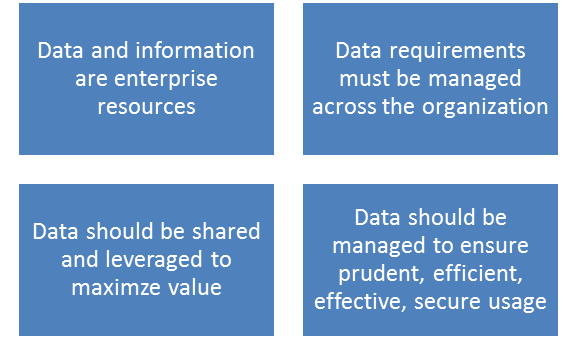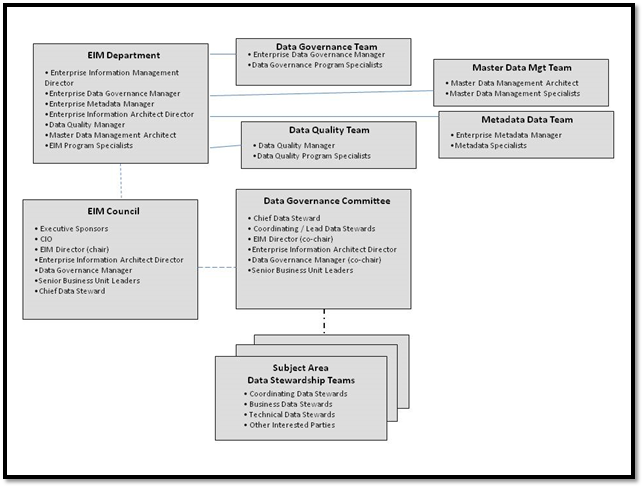Data governance is the foundational component of the enterprise data management function. It is responsible for the development and implementation of policies and standards for managing data and information across and within the organization.
Data governance is the planning, oversight, and control over management of data and the use of data and data-related resources, and the development and implementation of policies and decision rights over the use of data. It is the foundational component of an enterprise data management or enterprise information management program.
Data governance is not information technology (IT) governance. IT governance makes decisions about IT investments, the IT application portfolio, and the IT project portfolio. Data governance is focused exclusively on the management of data and information assets. Some enterprise issues can require the inclusion of data governance and IT governance professionals and practices (e.g., information security and privacy).
Data governance encompasses the people, corporate processes and procedures that ensure that organizations can deliver data value, data quality improvement, develop and maintain data and its metadata, and provide availability of the right data at the right time to the right people in the right format. Therefore, data governance can be seen as building standards and requirements for the collection, identification, storage, and usage of the asset called “data.” It is a long-term process; a successful, sustained data governance program does not happen overnight.
Fundamentally, all data governance programs share the same goals:
- Enable effective and secure decision making concerning the management of data and information resources
- Reduce operational friction caused by a lack of governance of data and process at all levels of an organization
- Train management and staff to adopt and implement common approaches to data management
- Build standards and processes that allow for common and operative management of data
- Reduce the costs and increase the effectiveness of data management and usage
- Ensure transparency of the process of data management and the governance of data
Data Governance Benefits
- Consistent and comprehensive management of knowledge through management of data and metadata (definitions, context of the data, etc.) in all areas of the organization
- Education, communication, and understanding of organizational objectives, especially those that concern the use of data and information
- Appropriate enterprise approach to data management by identifying all business areas that use information and capture their requirements
- Well-defined and executed processes for data capture, definition, and conflict resolution of data-oriented issues and challenges
- Providing an enterprise glossary and a data dictionary accessible to the entire organization to develop and maintain a common company vocabulary (metadata management)
- Guidelines and criteria for transactional and enterprise definitions for data and their updates, sourced centrally and available across the organization
- Leveraging the value of existing data among teams through re-use of validated data
- Clear, practical, and actionable practices for the effective uses, care, and feeding of data to ensure proper training and continuation of knowledge transfer concerning data management
Data Governance Principles

Data Governance vs. Data Stewardship
Data governance provides the principles, processes and organizational definition to preserve and enhance the data asset. This function is performed by data management / data governance professionals.
Data stewardship enables the organization to make sound, consistent decisions using the knowledge of the business people about the data they use daily within the guidance of industry standards and best, proven practices for data management, supported by the guidance of data management and data governance professionals.
A data steward is a person who is responsible for implementing the policies and standards that are developed by the data governance organization. Usually a data steward is a business staff member with deep experience in a specific subject or functional area (customer data, product data, accounting data, etc…). Business data stewards work to improve the quality of data (content) and metadata (context) for the organization’s critical data, following the principles and standards identified by the data governance program. Data Governance and Data Stewardship are not synonymous; they are complementary.
Critical Success Factors for Successful Data Governance and Data Stewardship
Successful implementation of data governance and data stewardship at any organization is not a foregone conclusion. Following are some factors that are critical to the long-term success of any data governance program and the data stewardship function:
- Strong and continuous executive management understanding, attention, involvement, and support for an enterprise data management and data governance initiative, including enforcement for compliance of data-centric policies, and methods for data management
- Strong and continuous systems management understanding, attention, involvement, and support for alignment of data governance / enterprise information management with the rest of information systems and technology management
- Data planning must be closely linked to organizational and information technology planning
- Development and sustainment of a formal data governance program office, sufficiently staffed by experienced data management and data governance professionals
- Planning for growth of the Data Governance program staff must be performed periodically and additional data governance professional specialists must be added to support program growth and sustainment
- Data stewards’ placement in the organizational structure must be re-evaluated periodically, with growth in the number of stewards accepted and included in planning
- Sufficient resources (people, time, tools and other technologies) are provided by the organization to adequately perform the data stewardship tasks
- Sufficient authority level is provided to data stewards and their governance bodies to carry out their tasks
- Data policies and standards are developed, maintained and adhered to consistently by the organization
- Effective training programs must be established to educate not only the data stewards, but also everyone with whom they interface
Organizing the Data Governance Function

Every data governance program needs an organizational structure that is aligned with the structure of its enterprise; one that fits its organization’s culture as well as one that serves the industry standards and proven practices of data governance. Doing all that may sound like an impossible task, but it is not, since there are some common data governance organizational formats that have been shown to be effective in organizations of every size, industry, and level of maturity.
EIM and Data Governance Teams
The development of an Enterprise Information Management Department to manage the operations of the EIM program is the cornerstone for all successful enterprise data / information management initiatives. This team is the foundational unit around which all activities for enterprise information management are coordinated and managed. Forming such a unit to manage the operations of EIM and providing oversight to certain components is considered essential to the success of enterprise information management (EIM) by all the experts and thought leaders in the field of information management.
In addition to the EIM team, organizations should create a dedicated Data Governance unit as part of the EIM Department. The data governance team would start with the creation of crucial positions specifically dedicated to enterprise data governance: a full time Data Governance Manager and at least two (2) experienced full time Data Governance Specialists. Additional Data Governance Specialists will be needed to support the enterprise program once it grows to encompass more than half the subject areas in the organization.
Business Data Stewards
It is important to note that not all data in any organization is subjected to data governance or to data quality management, only the data that is considered to be critical / essential / important to the organization’s operations or decision making capabilities. In most organizations, the mission-critical subset of data is approximately 20%-30% of the total data stored. However, the governed data must be managed with consistent methods so that the enterprise can apply standards and metrics to that management for evaluating the program’s success. The business data stewards are subject matter experts in the data for a particular business area (or subset of an area). They provide the knowledge of the data, its business meaning / definition / usage patterns / etc., enabling the data governance professionals to establish the policies and standards for governing the critical data.
- A data steward has or shares responsibility for a particular domain of the enterprise, and knows who does what with data within that domain, i.e., he or she has local knowledge from the business perspective (not technical).
- A data steward coordinates the promotion of good data governance practices within their domain.
- A data steward assists in getting resolution to cross-organizational data-related issues.
- Most data stewards are not full-time positions; they are designated as stewards in the course of their regular jobs (senior claims analyst, lead financial services representative, senior compliance officer, lead underwriter, etc…) and have received specific training as a business data steward.
Policies and Standards in Data Governance
In most organizations, the Data Governance function is responsible for establishing and maintaining the policies and standards that apply to all data used by the enterprise. These policies and standards enable the company to define the quality of its data, and allow the organization to perform its operations and make decisions secure that its data and information are accurate, complete, valid, consistent, etc.…
Data Policies are the general business rules and processes that an enterprise uses to provide guidance for the management of data and information. Policies might include directives on conformance of data to business rules, statement providing guidance for protection of privileged or confidential data, or documents defining enterprise data management functions, and other directions for how the organization should manage its data.
Examples:
- Data Classification Policy
- Data Sharing Policies (internal and external sources)
- Data Governance Policies
- Data and Information Security Policies (compliance, regulatory requirements, internal corporate requirements, etc.)
- Data and Information Privacy Policies (compliance, regulatory requirements, internal corporate requirements, etc.)
Data Standards are defined as the precise criteria, specifications, and rules for the definition, creation, storage, and usage of data within an enterprise. Data standards include basic context items for data objects such as naming conventions, character length, value ranges and classification types. Data Stewardship teams may dictate specific quality measures, retention rules, and backup frequency separately from enterprise data standards, for use within a particular domain.
Examples:
- Data Format Standards, such as Name and Address
- National / International and Industry Data Standards (e.g.,HL7, ISO)
- Data Quality Standards, based on the data quality dimensions (accuracy, completeness, validity, consistency, relevance, timeliness, etc.)
- Meta Data Standards (ISO 11179 as foundation)
- Data Model Standards
Policies and standards should be written using templates, so that each policy and each standard follows a similar format. Doing so makes it easier for writers to include the relevant material (and refrain from including unnecessary details), and to allow all stakeholders to understand and implement the policies and standards consistently.
Challenges in Data Governance
Every organization faces a variety of challenges in designing and implementing a data governance program. Most enterprises report the following similar challenges that can affect successful implementation of a data governance initiative.
- Lack of management support for data governance initiative: The most common challenge faced by organizations attempting to develop a data governance program is the lack of interest or support from executives and managers. This reluctance stems, usually, from the organization’s historical neglect of data’s value as an asset, and executives’ failure to recognize the need to implement a data governance program that will establish policies, standards and controls that manage data throughout the organization to provide business value.
- Lack of enterprise data strategy that recognizes value of data and its management as an asset: Most organizations have a business strategy that outlines the goals and objectives the enterprise plans to achieve. However, very few organizations have a companion data strategy, a document that takes the goals of the business strategy and applies them to the data and information assets. Without a data strategy, organizations cannot define how their data and information serve them as resources, and without this knowledge, the value of managing that data through data governance is lost, making it difficult to justify a data governance initiative.
- Lack of understanding of purpose of data governance: Many organizations misconstrue the term “data governance” with “data management,” or with “data controls.” As Gwen Thomas, in an interview with Tech Target stated, ” they confuse little g governance” – policies and controls that are embedded in processes, systems, data stores and data flows to ensure that data meets user expectations – and Big G Governance – the highly political negotiations, decision making and policy setting that informs and supports little g governance.”
- Lack of data governance framework or methodology: Successful data governance programs start with a framework or methodology for data governance that is based on industry standards and best practices, with an approach that has been proven through many implementations. Failed data governance programs are implemented without the use of a proven framework or methodology and rely on anecdotal approaches to data governance rather than empirical, evidence-based methods and processes.
- Lack of formal Data Governance Office or team for program management: Research by several organizations, including EWSolutions, indicates a higher success rate in data governance implementation for organizations that have a formal Data Governance Program Office or team than enterprises that do not include this staff. A small, dedicated, experienced team of data management and data governance professionals can provide a variety of services. They can serve as the knowledge resource for data governance, manage the variety of projects that arise as part of the initiative, educate the organization in data governance best practices, customize a framework or methodology to fit the organization, and serve as champions for sustaining data governance throughout the organization.
- Lack of sustained funding for data governance effort at enterprise level: Many organizations continue to fund data governance at the project level, refusing to accept the enterprise nature of the discipline. As a result, the sustainable, organization-wide benefits of data governance are never realized, and the program withers and dies slowly. Organizations that fund data governance at the enterprise level reap the cross-department, company-wide benefits of data rationalization and usage, improved data management and policies, with common standards and controls, along with improved data quality and enhanced metadata management.
Conclusion
Data Governance is the cornerstone function in an enterprise data / information management program, without it no organization can manage its data effectively. Data Governance combines management of metadata and the development of policies and standards by which data quality is measured. It includes the development and implementation of processes for managing organizational use of data, making data governance one of the most important activities an organization can execute to ensure effective use of its data and information resources.







